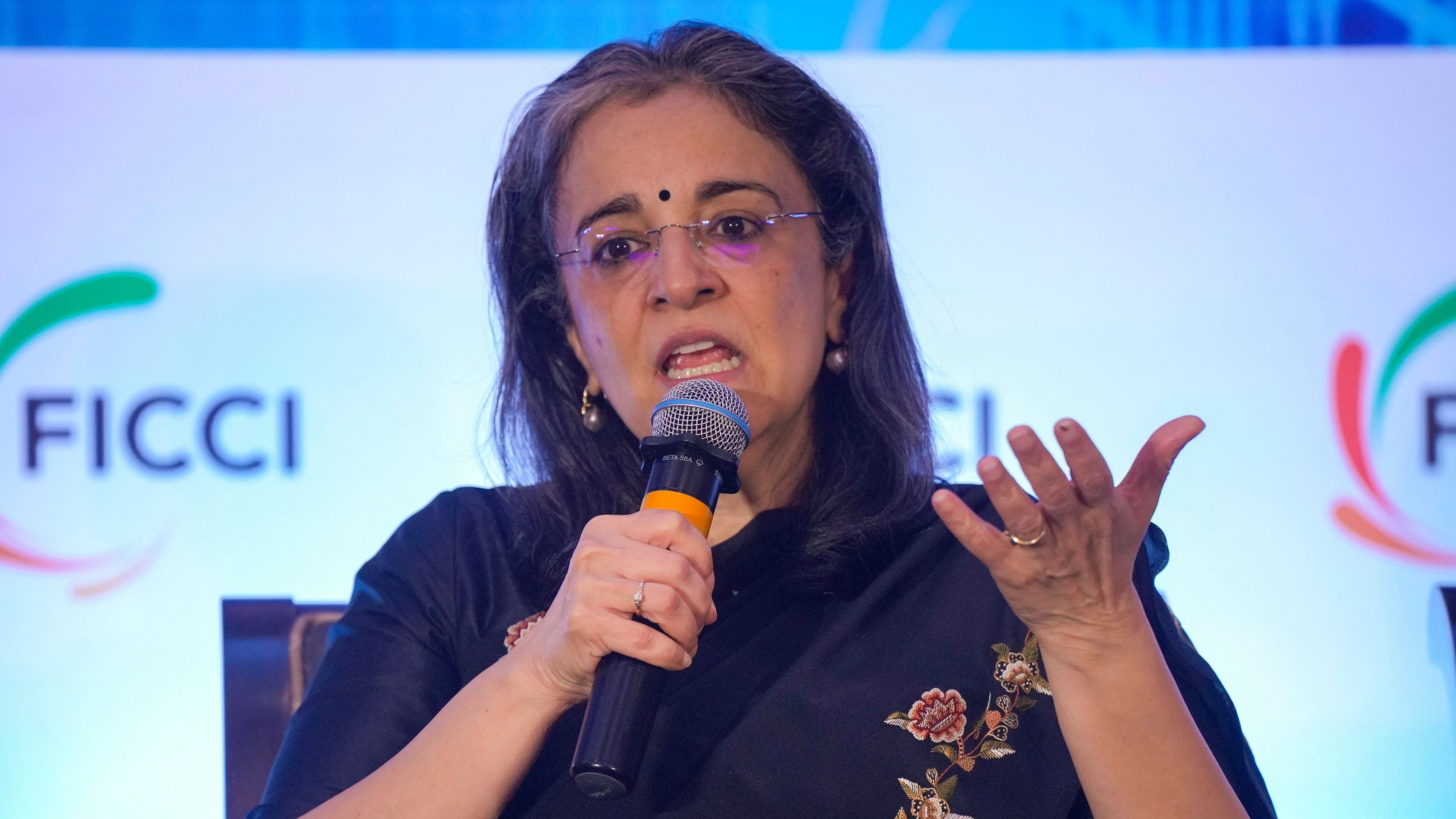
SEBI chairperson Madhabi Puri Buch.
Credit: PTI Photo
‘Quis custodiet ipsos custodes.’
This Latin phrase aptly summarises the ongoing tirade between the trio representing three distinct players in Russian roulette — the short-seller, a business conglomerate, and the market regulator.
Even as the fireworks surrounding allegations and counter-allegations continue to light up the political space, it is essential to view the unfolding scenario strictly from a non-polemical lens. At the outset, there is the ethical dimension, which appears to have been confined to oblivion.
Starting from Hindenburg, the modus operandi as well as the timing of the scathing report merits several inconvenient questions. First, despite the precarious characteristics of a short seller, there cannot be lapses in transgressing the Indian regulatory norms which prohibit communication of market-sensitive information outside the trading hours. By using a social media platform to create sensation about purported information related to India, Hindenburg surely appears to have compromised integrity by plausibly alerting vested interests to take positions before the opening hours of the Indian market creating an uneven level playing field much to the detriment of common investors who may lack sophistication both in terms of analysing information and executing trade.
Market regulator Securities and Exchange Board of India (SEBI), in its show cause notice previously, charged Hindenburg of sharing the previous report two months earlier to its public disclosure, including placing bets on Adani stocks in collusion with Kingdon before the information became public to make profitable gains. Even with technical differences, such actions carry a dizzying parallel to insider trading which is legally prohibited by capital markets.
Hindenburg’s successes in making a moolah by shorting Nikola (prototype without any product in place!) and Lordstown Motors are vastly different from the Adani Group as the latter is an established business conglomerate with businesses concentrated around the infrastructure sector.
SEBI has traditionally permitted participatory notes (p-notes), which come closest to hedge funds as a vehicle to invest in Indian equity markets. However, unlike hedge funds, p-notes notwithstanding their ambiguous identity need to obtain the market regulator’s nod as they are treated on par with Foreign Institutional Investors (FII). Moreover, p-notes tend to diversify risks representing agglomeration of individual funds. Unlike hedge funds, p-notes are permitted to act as market makers by providing depth and liquidity to the markets.
The pace at which the markets in the US have written the epitaph of hedge funds offers a sombre reminder of the exorbitant risks they inherently carry as the Securities and Exchange Commission is interested in insulating small investors from the downside risks also known as value-at-risk (VaR). It, therefore, looks odd to see hedge funds and seasoned short sellers smelling windfall on the presumptive gullibility of the emerging markets.
On its part, the Adani Group has a crying need to put its house in order by committing to full disclosure, transparency, and reporting to allay the concerns of investors and stakeholders surrounding the charges levelled by the short seller. Despite some of the grey areas in regulations about related-party transactions, the conglomerate would be well placed in making material voluntary disclosures to repudiate misgivings on informational efficiency. Empirical evidence shows that firms resorting to both mandatory and voluntary disclosures are well placed in guiding investors on future earnings with positive ramifications on stock prices.
SEBI inevitably has left many questions unanswered. Having known that one of the well-known short sellers was on the prowl, it ought to have anticipated these developments and solved the regulatory jigsaw puzzle by enacting rules and regulations exclusively for foreign short sellers. As India is increasingly eyed as an alternative to China, it is only natural for foreign investors to scrutinise India’s books with a magnifying lens to not only invest from a long-term perspective but also exploit glaring loopholes to earn windfall gains. In this regard, SEBI can emulate the SEC by deepening regulatory reforms with a twin objective of enhancing market competitiveness and robust checks and balances to achieve a level playing field.
A regulatory sandbox aimed at financial innovation in a controlled regulatory environment is one of the areas that can provide further impetus in expanding capital markets while permitting regulatory efficiencies in sync with the fast-evolving financial markets driven by technological renaissance. To ensure a well-governing market regulator, it is pivotal that the person at the helm is vouched for by an independent body with a constitutional remit to ensure unimpeachable integrity without any scope for conflict of interest.
If India is to achieve a developed economy status by 2047, the work for SEBI and Indian Inc has just begun.
(Ullas Rao is associated with JAGSoM, Vijaybhoomi University Mumbai as Visiting Associate Professor, and is a Faculty with the London Institute of Banking & Finance (MENA), Abu Dhabi, UAE. X: @Ullasrao7.)
Disclaimer: The views expressed above are the author's own. They do not necessarily reflect the views of DH.